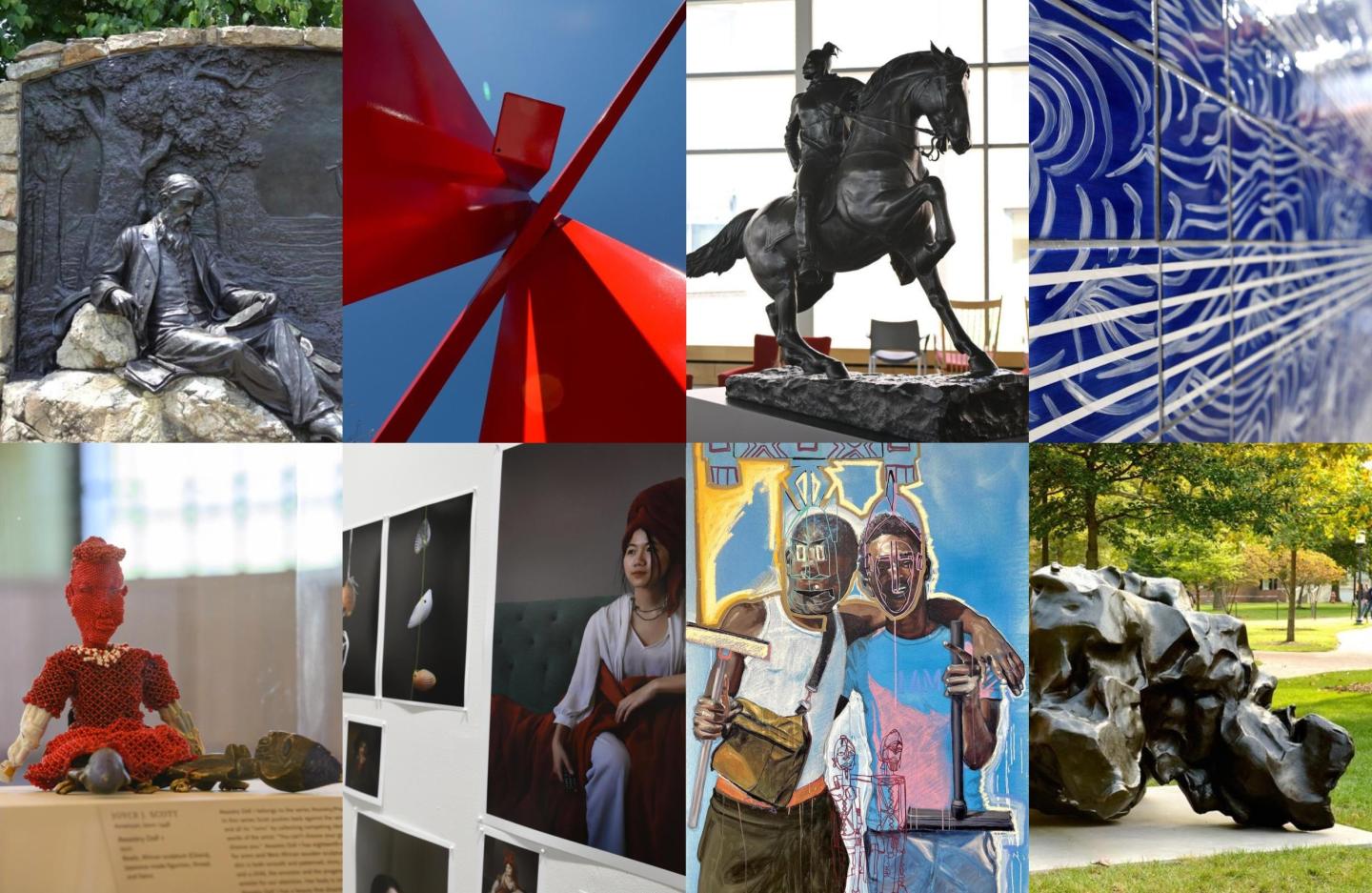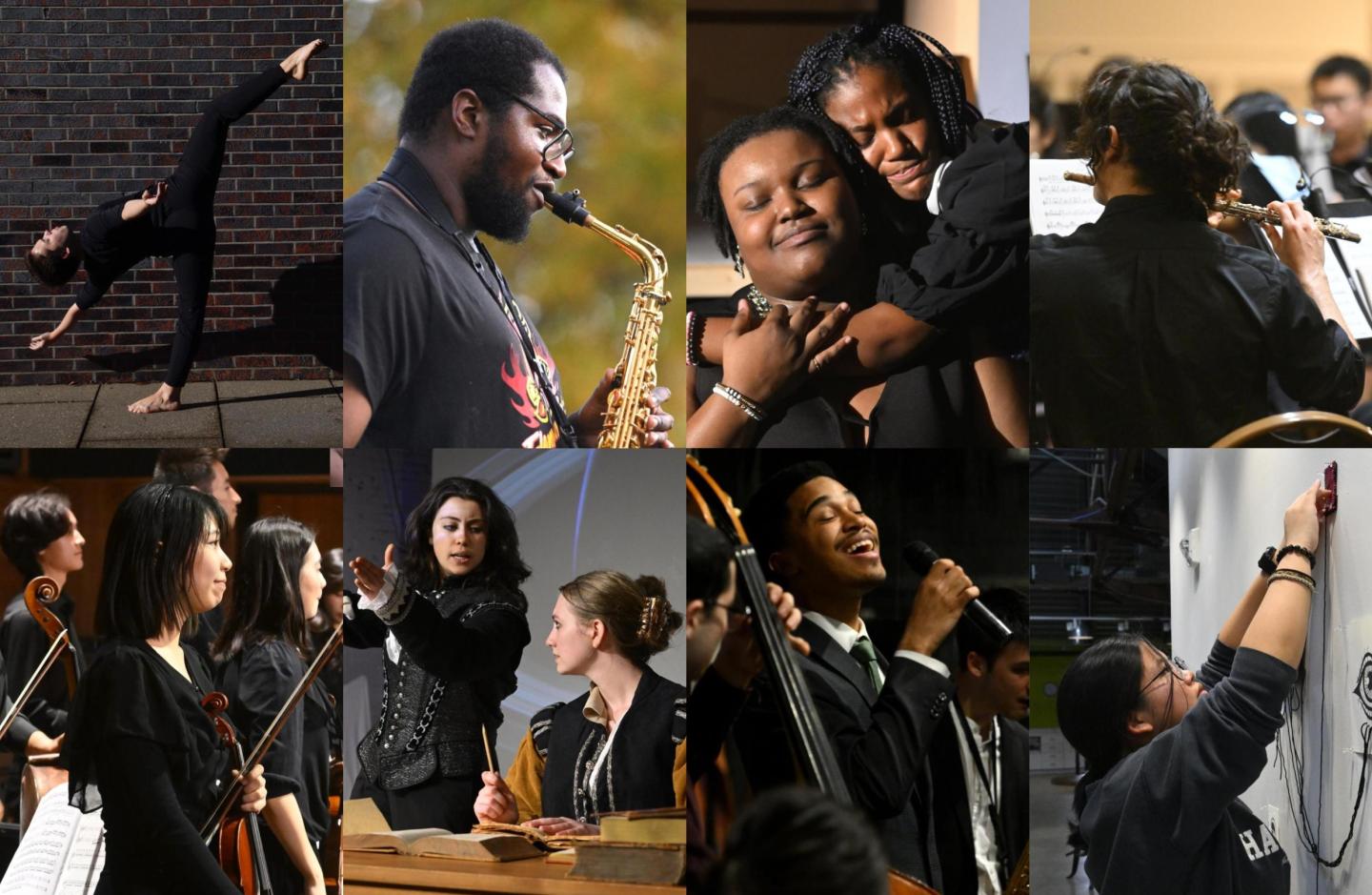Johns Hopkins University boasts a well-deserved reputation as a place to pursue medicine, engineering, and the health sciences. Yet the arts are also a central part of university life, from striking campus sculptures to stirring student performances to soaring Peabody symphonies. Under the guidance of Provost Ray Jayawardhana, the university is launching an initiative to elevate and enhance arts offerings across the university, and to increase awareness of the art already in our midst.
Nearly 1,000 public performances take place on Peabody’s campus annually, and Johns Hopkins is home to three museums and more than 200 works of art on view in public spaces. Among them, Robert Israel’s super-sized family of puffer fish float playfully in the entryway of the Johns Hopkins Children’s Center; Kendall Buster’s white lanterns, Vessel Field, hover above Gilman Hall’s atrium; and Shahzia Sikander’s mosaic Metaxu enlivens a café wall in the Hopkins Bloomberg Center in Washington, D.C. The list goes on.
“As we prepare to celebrate 150 years of academic excellence at this university, it is fitting that we embrace the arts as a vital force that can unite, uplift, and propel us forward.”
Ray Jayawardhana
Provost
This new initiative will aim to bolster the arts across the university, embracing their potential to invigorate community, enrich student learning, and inspire the exchange of ideas across disciplines and divisions.
“The arts inspire creativity, spark dialogue, and explore the variety of human experience and emotion,” Jayawardhana said. “We are excited to embark on a focused effort to ensure the arts are elevated as an integral part of the Hopkins identity and tightly woven into the fabric of our community. Through this initiative, we will strengthen our artistic offerings, foster new cross-disciplinary collaborations, and deepen our connections with Baltimore and the wider world around us. As we prepare to celebrate 150 years of academic excellence at this university, it is fitting that we embrace the arts as a vital force that can unite, uplift, and propel us forward.”

Image credit: Johns Hopkins University
Making the arts integral
The effort will be led by Daniel H. Weiss, Homewood Professor of the Humanities at Johns Hopkins and president emeritus of the Metropolitan Museum of Art in New York, where he served as president and chief executive officer from 2015 to 2023. Weiss’ ties to Johns Hopkins date to his days as a doctoral student pursuing a PhD in Western medieval and Byzantine art, which he earned in 1992. Afterward, he stayed on as an art history professor, eventually becoming chair of his department and dean of the Krieger School of Arts and Sciences, before leaving to serve as president of Lafayette College and, later, Haverford College.
“I returned to Hopkins last summer eager to be part of a place that means so much to me and where I spent so much of my professional life,” Weiss says. “I have so much enthusiasm to be part of this community.”
Upon returning, Weiss says, he saw an opportunity to increase the collective consciousness of the arts at Johns Hopkins—to make the arts integral to the Hopkins experience.
“All great universities take very seriously their commitment to the arts and humanities. Johns Hopkins has always had that commitment, but it hasn’t always been highly visible, synergistic, or strategic.”
Daniel H. Weiss
Homewood Professor of the Humanities
“All great universities take very seriously their commitment to the arts and humanities,” Weiss says. “Johns Hopkins has always had that commitment, but it hasn’t always been highly visible, synergistic, or strategic.”
The arts initiative aspires to change that, starting with the creation of a task force made up of faculty, staff, administrators, students, and trustees working in partnership with supporters and friends. The task force will convene this summer to assess current arts programming and identify areas of opportunity to invest in facilities, strengthen cultural programs, and formulate ambitious initiatives before presenting a report and recommendations in the spring of 2025. Then, as JHU celebrates its 150th anniversary in 2026, the team will start to implement its plan.
As part of the endeavor, Weiss has taken on a new role as senior adviser to the provost for the arts. He will work with Julie Messersmith, chief of staff and associate vice provost for strategic initiatives, and Kristin Blanchfield, senior associate vice president for philanthropic partnerships, to spearhead the initiative.

Image credit: Johns Hopkins University
More than visual art
While assessing and adding to the university’s visual arts offerings are part of the initiative, the task force will also examine and add to arts-related programming, projects, and research.
Already, a plethora of research and programming exists across the university. Best known are the Peabody Institute’s world-class music and dance performances, extensive concert calendar, professional training for its Conservatory students, and performing arts instruction for community members through its Preparatory. Peabody’s dual degree program and growing footprint in arts and health—including the recent appointment of a Bloomberg Distinguished Professor in Performing Arts and Health—integrate the performing arts across multidisciplinary areas of study.
“The history of civilization is in many ways seen through the lens of its arts and artists. As a world-renowned university, Johns Hopkins can shape that lens.”
Fred Bronstein
Dean, Peabody Institute
“While Peabody—a professional school that recruits and trains the next generation of musicians and dancers—is an integral part of Johns Hopkins, I am so happy to see the launch of an initiative to engage our entire university community in the arts,” Peabody Institute Dean Fred Bronstein said. “The history of civilization is in many ways seen through the lens of its arts and artists. As a world-renowned university, Johns Hopkins can shape that lens by reflecting the essential nature and magic of an arts experience back to its community, and to the world.”
Lesser-known opportunities are plentiful, including courses like Art and Social Justice in the Krieger School, which connects students with the Sheridan Libraries’ vast archival collections, and the Whiting School’s HEMI/MICA Extreme Arts Program, which brings together artists and engineers to experiment and innovate. Among many others:
-
The Brain Science Institute’s International Arts + Mind Lab explores how the arts, architecture, and design nurture our minds and foster well-being;
-
The Center for Music and Medicine investigates the role of music in health, using rhythmic activities and musical performances to help treat patients with neurological illnesses;
-
And Cosmic Visions, a research project of Classics Department chair Karen ní Mheallaigh, involves partnerships with Baltimore City Public Schools and the James Webb Space Telescope, building bridges between the humanities and STEM with the ultimate aim of inspiring science-literate humanities scholars and STEM scholars skilled in humanistic inquiry.
“The arts enrich our humanity. Through them, we can often speak across political differences, uncover hidden sides of ourselves, and partake of an enterprise that has characterized human life since its inception,” Krieger School Dean Chris Celenza said. “The Krieger School’s rich arts programs, from theater to visual arts to film and media studies, contribute to this mission already, and we could not be more excited and eager to be part of this larger initiative, led by Dan Weiss.”
“The arts enrich our humanity. Through them, we can often speak across political differences, uncover hidden sides of ourselves, and partake of an enterprise that has characterized human life since its inception.”
Chris Celenza
Dean, Krieger School of Arts and Sciences
Celenza added that, as director of the American Academy in Rome from 2010 to 2014, he “saw firsthand how the arts make a community come to life.”
Even as the task force and initiative kick off, the university continues to introduce new and exciting arts ventures. For one, nine works of art by Baltimore-based artists—all on the cusp of international acclaim—were recently acquired by the university and will soon be installed on JHU campuses or in Hopkins spaces. And at the Hopkins Bloomberg Center, the state-of-the-art theater houses weekly Peabody performances in a building that is a work of art itself.
“Across the institution we preserve and share vast troves of cultural and scientific materials, all of them brimming with artistic possibilities. For these disparate collections to be brought together as part of a cohesive strategy and integrated with academic and student experiences is a critical step to maximizing that potential,” said Elisabeth Long, Sheridan Dean of University Libraries, Archives, and Museums. “We look forward to partnering with the task force, and I join my colleagues across the institution in eagerly anticipating the day when Hopkins’ rightful reputation as an artistic center will rival its scientific preeminence.”
Task Force on the Arts
-
Tunde Ayodeji, Mechanical Engineering Major ’26, Whiting School of Engineering; Music Minor ’26, Krieger School of Arts and Sciences
-
Cybele Bjorklund, Vice President for Federal Strategy; Executive Director of the Hopkins Bloomberg Center
-
Margaret Burri, Associate Director for Academic Liaison and Special Collections, Sheridan Libraries and Museums
-
Anna Celenza, Professor of Musicology, Peabody Institute; Professor in The Writing Seminars, Krieger School of Arts and Sciences
-
Lisa Cooper, Bloomberg Distinguished Professor, School of Medicine, Bloomberg School of Public Health, and School of Nursing
-
Carl DuPont, Associate Professor of Voice, Peabody Institute
-
John Gardner, Master of Business Administration ’25, Carey Business School
-
Sarah Hoover, Associate Dean for Innovation in the Arts and Health, Peabody Institute and Johns Hopkins Medicine
-
Jennifer Kingsley, Associate Teaching Professor and Director of Museums and Society, Krieger School of Arts and Sciences
-
Susan Magsamen, Executive Director of the International Arts and Mind Lab, Pedersen Brain Institute
-
Dean Moyar, Vice Dean for Humanities and Professor of Philosophy, Krieger School of Arts and Sciences
-
Jackie O’Regan, Curator of Cultural Properties, Sheridan Libraries and Museums
-
Carmine Petrone, Krieger Alumnus ’04; Trustee, JHU; Chair, Sheridan Libraries Advisory Board
-
Corrine Sandone, Director of the Department of Art as Applied to Medicine, School of Medicine
-
Nicoleen Willson, Director of the Office of Arts and Innovation, Student Affairs





